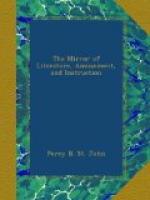“Our visiters remained with us a considerable time, and in the course of conversation, one of them observed that they had in their possession a tobe, which belonged to a white man who came from the north many years ago, and from whom it had been purchased by the king’s father. We expressed great curiosity to see this tobe, and it was sent us as a present a short time after their departure. Contrary to our expectations, we found it to be made of rich crimson damask, and very heavy from the immense quantity of gold embroidery with which it was covered. As the time when the late king was said to have purchased this tobe corresponds very nearly to the supposed period of Mr. Park’s death, and as we never heard of any other white man having come from the north so far south as Boossa, we are inclined to believe it to be part of the spoil obtained from the canoe of that ill-fated traveller. Whether Mr. Park wore the tobe himself, which is scarcely probable on account of its weight, or whether he intended it as a present to a native chief, we are at a loss to determine. At all events, the article is a curiosity in itself; and if we should live to return to England, we shall easily learn whether it was made there or not. The chief himself has never worn the tobe, nor did his predecessor, from a superstitious feeling; ‘besides,’ observed the king, ’it might excite the cupidity of the neighbouring powers.’
“Sunday, June 20th.—The king sent a messenger this morning, to inform us that he was a tailor, and that he would thank us for some thread and a few needles for his own private use. By this man he likewise sent a musket for us to repair; but as it is Sunday, we have declined doing it till to-morrow. Eager as we are to obtain even the slightest information relative to the unhappy fate of Mr. Park and his companions, as well as to ascertain if any of their books or papers are now in existence at this place, we had almost made up our minds to refrain from asking any questions on the subject, because we were apprehensive that it might be displeasing to the king, and involve us in many perplexities. Familiarity, however, having in some measure worn off this impression, and the king being an affable, obliging, and good-natured person, we were emboldened to send Paskoe to him this morning, with a message expressive of the interest we felt on the subject, in common with all our countrymen; and saying that, if any books or papers which belonged to Mr. Park were yet in his possession, he would do us a great service, by delivering them into our hands, or at least by granting us permission to see them. To this the king returned for answer, that when Mr. Park was lost in the Niger, he was a very little boy, and that he knew not what had become of his effects; that the deplorable event had occurred in the reign of the late king’s predecessor, who died shortly after; and that all traces of the white man had been lost with him. This answer disappointed our hopes,




